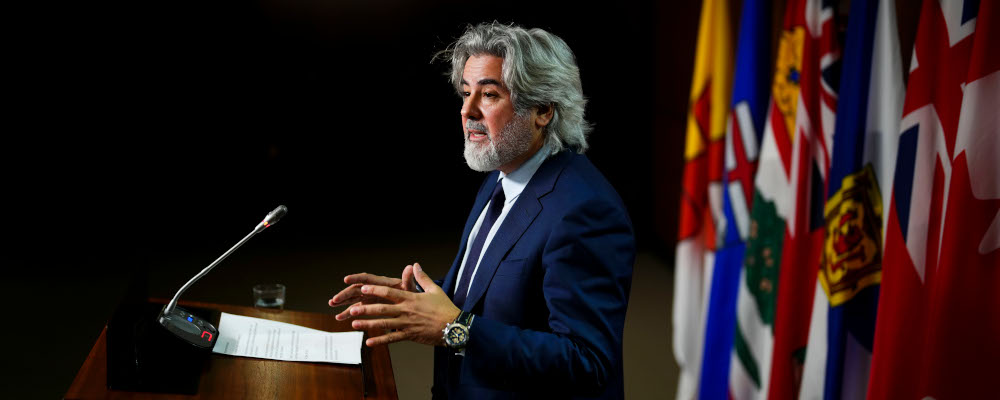When you don’t know where you’re going, you never know where you’ll wind up.
That pretty much tells the Excellent Adventure tale of Heritage Minister Pablo Rodriguez’s Bill C-18, also known as the Online News Act. What started out as a rescue scheme for traditional newspaper companies has turned into either a windfall for Bell and other profitable broadcasters, a lot of fuss about a little, or—and this is where the smart money’s currently going—a massive legislative boondoggle.
This is why:
Early in 2021, led by Rupert Murdoch and his 60 percent ownership of media Down Under, Australia implemented legislation that forced Facebook and Google—whose inventions have proven far more popular with advertisers than traditional media—to make deals with media companies. Murdoch alleged but never proved that these companies were unfairly taking/stealing/scraping news content and demanded compensation. The companies said this was, more or less, nonsense and pointed out they provide news media with access to millions of eyeballs at no cost—something that would otherwise cost hundreds of millions. But Down Under, what Murdoch wants, Murdoch gets. Facebook went so far as to block the posting of news links—a particularly controversial move during a pandemic—but relented after the government amended its legislation.
A year later, it was already expressing regret and hinting that it was thinking of getting out of the business of carrying news.
“We have faced concerted lobbying from news publishers who have no regard for the economic reality that commercial agreements need to be able to generate a return for both parties,” Meta wrote in Australia’s 12-month review of its law. “The legislation has misled them into thinking they are entitled to payment simply for using our free services to expand their own audience. It is a near-impossible task to make commercially sound and innovative investments in news that could potentially bring a high enough return to trigger more investment in future—while balancing impossible expectations from news publishers.”
Regardless, Rodriguez has carried on. While the government was determined to help the likes of Postmedia, Torstar, and Le Devoir, it didn’t want to be seen to be directly subsidizing media. So an adaptation of the Australian plan through Bill C-18—essentially a subsidy wearing a cloak of commercial credibility—appeared to be the perfect way to calm News Media Canada, which had been lobbying desperately for what it termed “fair compensation.”
And then along came the broadcasters. While they hadn’t earlier complained about Facebook or Google, when they saw what was in the works, they quickly bellied up to the bar. And, as C-18 is designed to compensate news organizations based on their levels of online linkage, it turns out that they will be the ones who rake in the most cash. After the Parliamentary Budget Officer ran the numbers, it was estimated that C-18 would generate $329 million, and $249 million of it would go to broadcasters led by CBC. The traditional newspapers? They will get about $80 million between them —far, far less than the $500 million Postmedia director Jamie Irving estimated earlier this year was needed for them to survive.
Things didn’t get any brighter for Rodriguez and the newspapers when the Standing Committee on Heritage began reviewing the legislation. After several small independent media—there have been more than 200 startups in recent years—pointed out C-18 was going to tilt the playing field against them, the Internet Society Canada Chapter delivered its own withering assessment.
“The basic concept of C-18 is flawed,” it stated in its submission. “It uses the power of statute to run an extortion scheme that seeks to preserve a legacy business model whose economic rationale has been overtaken by new and more effective means of disseminating information to the public.
“C-18 betrays a complete lack of understanding of the Internet and the functions of news intermediary platforms.”
Then it got even worse.
Having been left out of the Standing Committee on Heritage consultations on a bill they were to be the primary source of funding for, Meta pointed out that it gives news publishers $230 million annually in free posts, that news is less than three percent of its business, and that “faced with adverse legislation that is based on false assumptions that defy the logic of how Facebook works, we feel it is important to be transparent about the possibility that we may be forced to consider whether we continue to allow the sharing of news content in Canada.”
Not surprisingly, this came just hours after Rodriguez had proudly told the Heritage Committee that “the world is watching.” As it turns out, that’s the problem. Meta is more than aware that if it pays the links ransom Canada is demanding, the global bill will wind up in the mega billions. And for something it neither does, needs, nor is popular with its users.
Sensing that, Meta was invited to appear before the Committee on Friday where it reconfirmed its position.
As their representative Kevin Chan put it, the scope of Bill C-18 is “globally unprecedented,” its premises are “peculiar and unorthodox”, and “regulation must be grounded in fact.”
This led not just to questioning but cross-examination from Liberal MPs that began aggressively with Anthony Housefather and rapidly escalated to the hysterical, contemptuous hyperbole for which fellow Liberal Chris Bittle has become notorious (he once accused Dr. Michael Geist, the grandson of Holocaust survivors, of being a racist). He denounced Meta for putting “lives at risk,” employing “terror tactics,” having contempt for the democratic process, and took every opportunity to badger and accuse Chan of “robber baron tactics.” It was obvious Meta had been invited to appear before the committee only so that its Liberal members could attack it and abuse its representatives.
As things stand, it’s fair to presume the Golden Goose that Bill C-18 assumed Meta to be is going to leave the nest—and take its eggs with it.
Recommended for You

Laura David: Red pill, blue pill: Google has made its opening salvo in the AI-news war. What’s Canadian media’s next move?

The Notebook by Theo Argitis: Mark Carney’s first major tests

The Weekly Wrap: Trudeau left Canada in terrible fiscal shape—and now Carney’s on clean-up duty

Ben Woodfinden: Lament for an ‘elbows up’ nation




